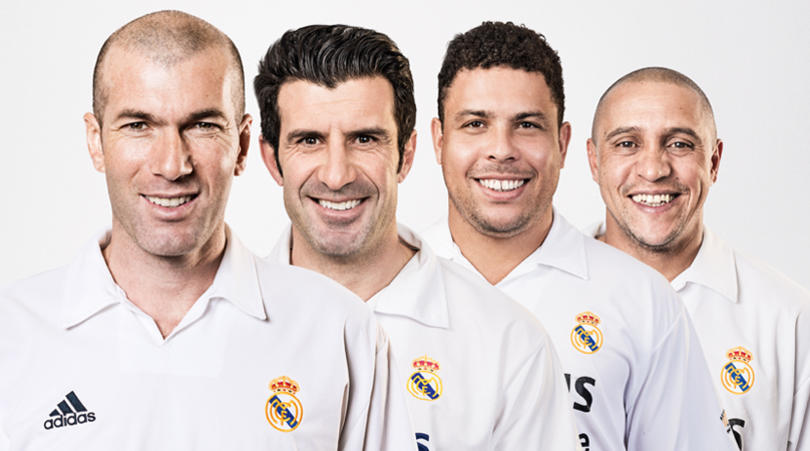Long read: Neymar – How boy became man... and the most expensive footballer of all time
The brilliant Brazilian’s displays last season suggested he was ready to step out of Messi’s shadow and become the new King of the Camp Nou. But PSG are about to land the 25-year-old, who owes it all to late-night sarnies, leading from the front... and one very lucky lemon
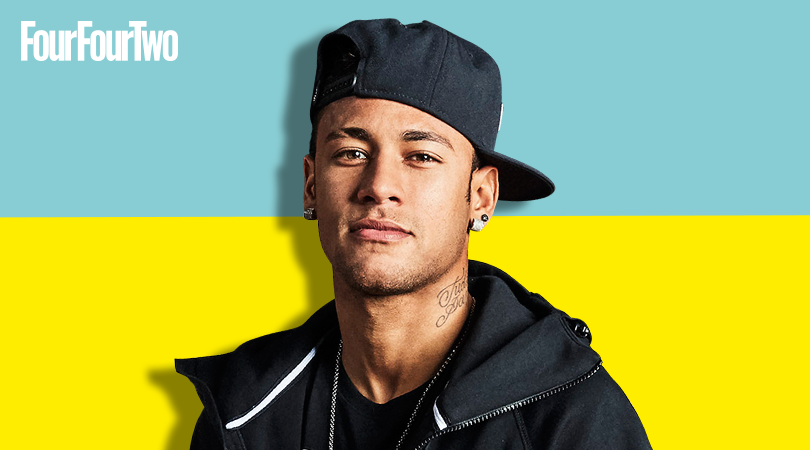
Forty years ago in a galaxy far, far away, Obi-Wan Kenobi had a choice: stand and fight, or allow Darth Vader to kill him. The Jedi master knew the only way to ensure the escape of his maturing apprentice – Luke Skywalker – and lead the Rebel Alliance to destroy the Death Star was to shoulder arms. He was swiftly lightsabered in half.
At 10.46pm on March 8, 2017, Lionel Messi – Barcelona’s very own extraterrestrial Jedi master – had his Star Wars moment. Los Cules still needed two injury-time goals to achieve the impossible and overturn a 4-0 first-leg defeat against Paris Saint-Germain in order to reach the Champions League quarter-finals – and they had just won a penalty. The remontada, the comeback, had to be maintained.
Messi and Neymar stood in the Camp Nou penalty area. The master had already converted once from the spot, but it was the presumptive heir’s curling free-kick just three minutes earlier which had injected life into a twitching Catalan corpse. “As long as there is 1% of chance,” Neymar had said before the game, “we’ll show 99% of faith.” In a desert of Barça banalities, there was a lone voice of belief.
There was only hope because of Neymar, and Messi knew it. This was a watershed moment. Messi has never before ceded such responsibility, but so inevitable was Neymar’s finish – and his glorious dinked assist for Sergi Roberto’s tie-clincher moments later – that the Argentine knew destiny was with another. He was passing the baton – or that's how it should have been anyway.
“Neymar proved he is more than Messi’s heir,” wrote AS. “He believed when no one else believed and produced when no one else produced.”
For the goals, for the opposition and for the difficulty of the situation, this is the best game I have played in my life
“For the goals, for the opposition and for the difficulty of the situation, this is the best game I have played in my life,” said the 25-year-old at full-time, with Barça having won 6-5 on aggregate. “I’ve spent the last week crazy for this night to arrive. Nothing is impossible – I told you.”
It was the performance Neymar had threatened since his 2013 move from Santos, but hadn’t delivered when Barcelona needed it most. After Christmas he was arguably the best player in the world, delivering goals, assists and countless man-of-the-match displays.
Get FourFourTwo Newsletter
The best features, fun and footballing quizzes, straight to your inbox every week.
The bloodless revolution on that spring night; the beginning of “Neymar’s consecration”, as one Spanish newspaper put it, will now continue in Paris – and it’s all down to a lifetime’s hard work on the streets, 3am sandwiches on the beach, protein shakes... and one lucky lemon.
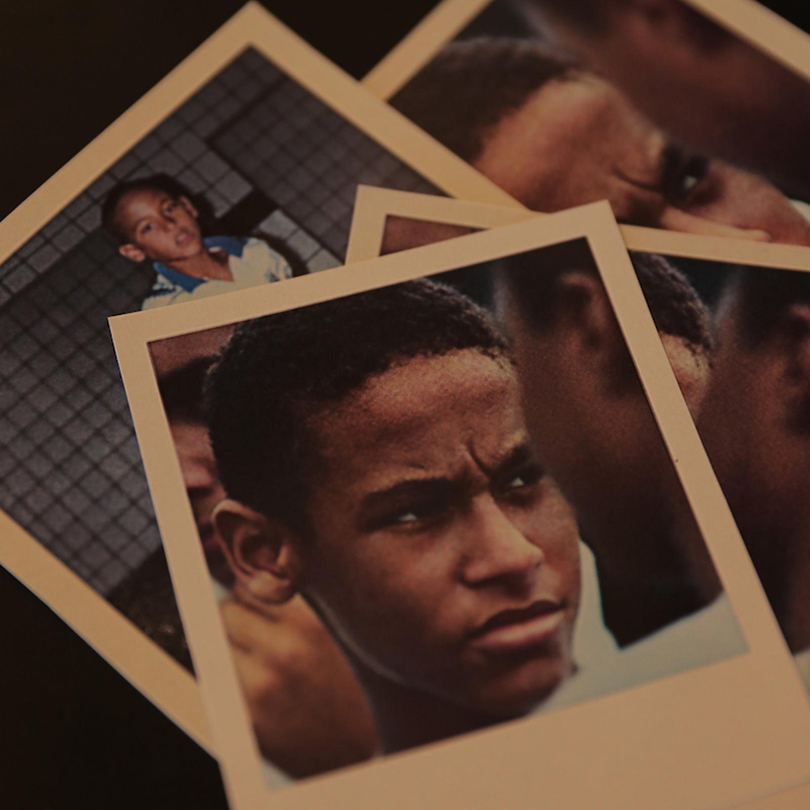
“If you lose a second, the ball is gone”
He soon graduated to the streets of Sao Vicente, where the tightly packed favela roads reverberated to the sound of a stick-legged and rake-thin Neymar honing his technique
If Neymar’s display against PSG proved one thing beyond reasonable doubt, it’s that the forward has something to which few other Barça players could lay claim to – dominance in one-on-one situations. While his Blaugrana colleagues preferred to prod and probe in front of serried opposition ranks, Neymar’s modus operandi is to commit defenders – and he picked it up at an early age.
Born in February 1992 in Mogi das Cruzes, a satellite town 40km east of Sao Paulo, Neymar da Silva Santos Junior’s early days were defined by football. He grew up idolising his dad, Neymar Sr, who was a professional for a number of middling clubs around Sao Paulo state.
By the time he had turned nine years old, ‘Juninho’ – as the family still call him – had 54 footballs in the room that he was sharing with his parents and sister Rafaela at his grandparents’ house, and could only sleep scrunched in a corner on a mattress.
“There was a small space between the mattress and the wardrobe, and it was in this narrow corridor that I used to play,” he wrote in his autobiography. Sometimes his sister and his cousin Jennifer would join in – but only as de facto goalposts. “They stood as obstacles and sometimes even wore jerseys so I could pretend it was a real match. I’d spend hours dribbling around them, learning to control the ball in a tight environment, just me against them.”
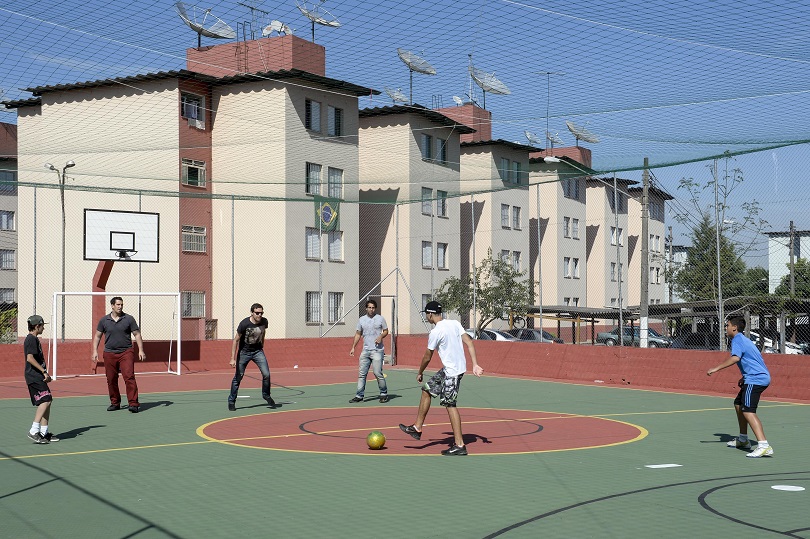
He soon graduated to the streets of Sao Vicente, where the tightly packed favela roads reverberated to the sound of a stick-legged and rake-thin Neymar honing his technique. Right foot, left foot. Repeat.
“I would wake up wanting to play football,” he tells FourFourTwo in an exclusive sit-down. “As soon as I arrived home from school, I would go straight outside and stay there until it got dark. I had a very happy childhood with my friends, and playing on the streets helped me – that fast game and that Brazilian smartness.”
As soon as I arrived home from school, I would go straight outside and stay there until it got dark
Ironically, Neymar first arrived into the wider public consciousness without a ball at his feet. It was late in 1998 and his father had just missed a penalty for Recanto de la Villa in their game against Tumiaru, but the six-year-old sprinting up and down the stand’s steps caught the eye of Betinho, a scout for local futsal clubs.
“He ran effortlessly – as though he was running on the flat – and his fitness, agility and co-ordination made an impression on me,” Betinho, who now works for Santos, later recalled. “I looked over at the father: he was well built and had good control. I looked at Nadine: she was tall and thin. Neymar’s parents were fine biological specimens. This made me wonder how the little ’un would play football.”
Betinho was right to wonder. Neymar had what Brazilians call jeito – an aptitude, an outrageous talent, for football. He moved as if dancing samba, or capoeira – a Brazilian martial art that combines combat with dance and music – so Betinho took his protégé to Portuguesa Santista, a local amateur team that had futsal in its blood.
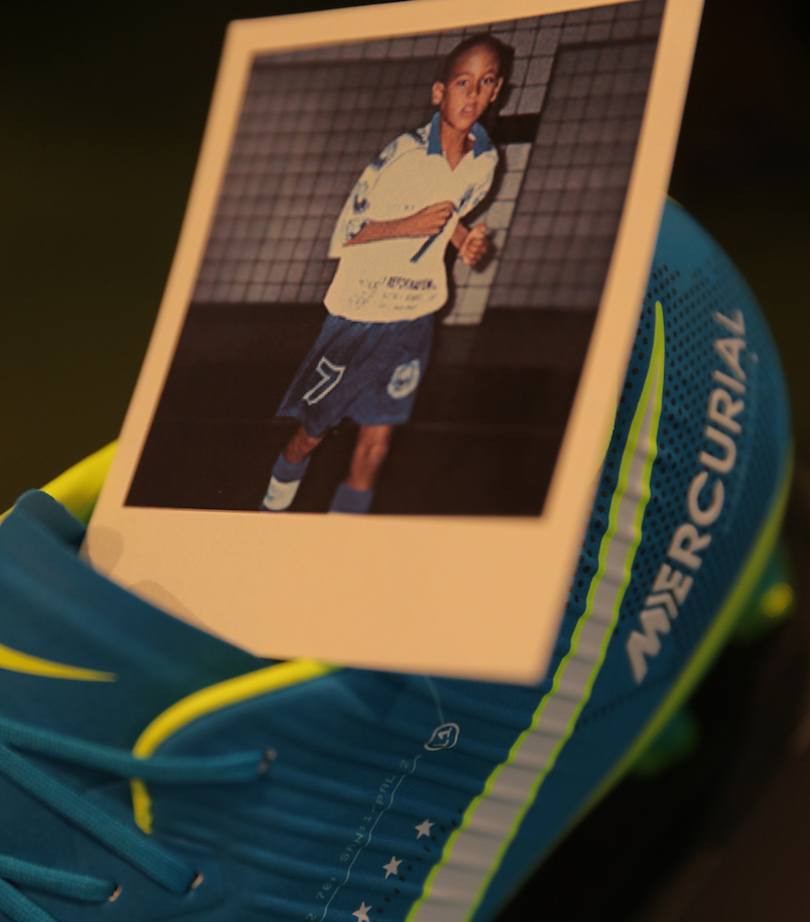
“Futsal is to blame for how I play,” chuckles Neymar, a smile forming across his face as he remembers the early years spent on indoor wooden courts perfecting his technique in small-sided games. “It has developed my technique, quick thinking and short moves. Futsal is fundamental to a footballer’s life. It had a big importance in mine.
“When you’re out there playing, you’re forced to think fast and move even faster – if you lose a second, then the ball will be gone. It’s a more dynamic game, and as there isn’t much space in the games that I play for Barça. You need to react quicker on the field.”
"I have found a boy with huge talent and enormous potential"
From a waif-like striker that was being battered from pillar to post, Neymar had turned into a deeper attacker, capable of driving forward to cause havoc
Tongues wagged as news of the tiny, capoeira-influenced individualist – who finished top scorer in his first tournament as a seven-year-old, with the trophy remaining Neymar’s most treasured memento – reached Santos, the area’s most famous football team and former home to Pele.
“I was amazed by what I saw, but I wondered if he could replicate it on a pitch,” says Antonio Lima, Neymar’s first youth coach with Santos, who played more than 700 times and lifted the Intercontinental Cup in 1962 and 1963. “I said to Zito, Santos’s academy director, that we had a problem. ‘I have found a boy with huge talent and enormous potential, but he’s 13 and we do not have a team for him.’
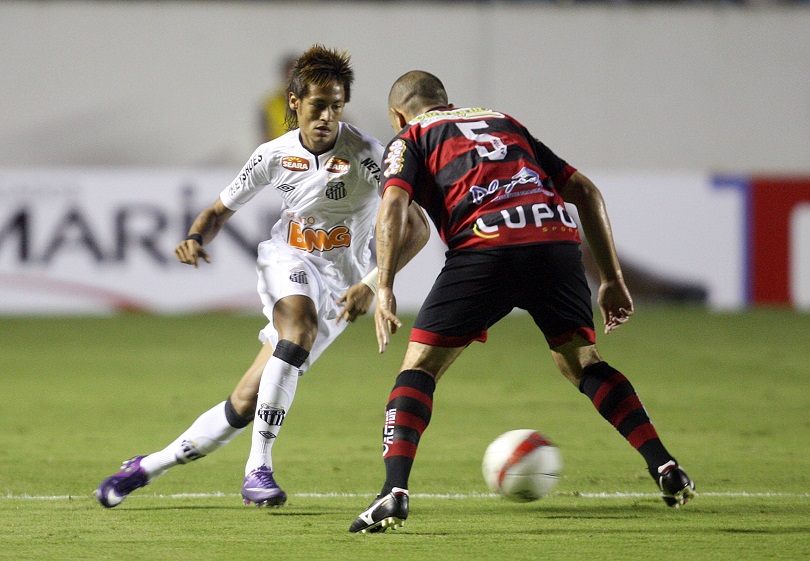
“Zito asked me, ‘Do you really believe in him?’ I said that I did, so we created a new 11-a-side team for his age group. Within a year, Neymar was playing with the under-15s.”
And his position had changed. From a waif-like striker who was being battered from pillar to post, Neymar had turned into a deeper attacker, capable of driving forward to cause havoc. A feverish desire to improve came to define his development into Brazilian football’s greatest hope.
“He has always just loved playing football and he would always stay on after training had finished,” explains Lima, who is still regarded by Neymar as the most influential coach in his football career. “He always listened and would analyse his own game.
After a brief 2006 flirtation with Real Madrid – home to two of his heroes, Robinho and David Beckham – the starlet penned his first professional contract with Santos three years later
“Before one game against Sao Bernardo, who were a really good side, we worked on a specific move for an entire week. At the very beginning of the match, I [turned away from the pitch] to shake hands with their manager – and then I heard people celebrating. Neymar had already scored, in the exact way we had trained the whole week. I thought, ‘Couldn’t you have waited a little longer so I could at least see it?!’ And I can still see that in Neymar, even today – you must never teach that purity out of a player.”
After a brief 2006 flirtation with Real Madrid – home to two of his heroes, Robinho and David Beckham – the starlet penned his first professional contract with Santos three years later, aged 17. As his prominence on the pitch grew, so did his influence and marketability off it. Santos’s success in the 2011 Copa Libertadores soon brought advertising deals that involved cups, cushions, cars, jeans and even scented sweets in his homeland.
He became a target for rough treatment – and a red card in that Copa Libertadores campaign for wearing an upside-down mask of his own face stands out – but the forward always remained humble.
“The first thing that new signings looked at was Neymar,” Muricy Ramalho, Santos’s manager during that Copa Libertadores win, tells FFT. “They saw what he was like at lunch, at dinner and in training... even if the new guy wasn’t disciplined, they would be after seeing Neymar – he never complained.
“The first people to be invited to his birthday party every year were Santos’s cooks, gardeners and kitmen – he went from the the bottom up. He was a manager’s dream because he was the team’s idol and the best player, yet he still worked hard. Neymar was a huge help.”
“Neymar, it’s 3am. I was asleep…”
Neymar’s nocturnal activities and apparent fondness of the limelight were a source of intrigue around Barcelona
By 2013, though, Neymar needed to move. The transfer to Barcelona had actually been arranged for the following summer, with Santos keen to maximise their prize asset going into Brazil’s home World Cup. But Blaugrana president Sandro Rosell was keen to avoid losing the world’s next best player to a rival.
Also, life around Neymar had become a circus. He was on the cover of Time magazine as ‘the next Pele’, accusations of brattishness and a lack of respect towards opponents followed him everywhere, and his love life became front-page news for the gossip magazines. He did, though, develop some ingenious tactics to circumvent attention.
“He used to wake me up at 3am,” says Elano, one-time Manchester City midfielder and Neymar’s former team-mate at Santos. “I would switch off my phone and tell the doorman not to let anyone in, but how can he say ‘no’ to Neymar?!
“He would knock on the door. I’d ask, ‘Who is this?’ And he’d say, ‘It’s Neymar. What are you doing?’ ‘Mate, it’s 3am – I was asleep!’”
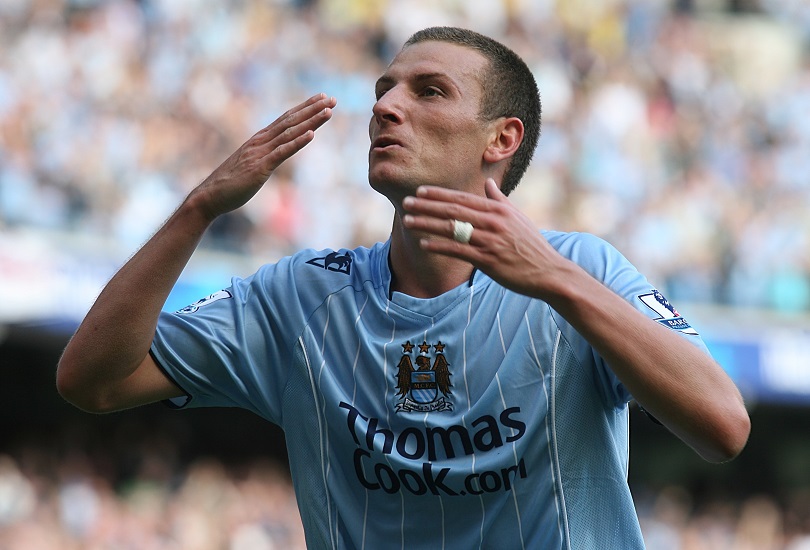
“Then we would go down to the beach, buy a sandwich and a soda, sit down and talk. He was a celebrity, and that was the only moment he could sit down calmly on the beach. He used to have around 50 to 100 children following him here, but he always gave them attention.
“Those were nice moments – that boy coming to my place at that time made me happy. I have never told anyone about this story, but if you ask him, he will confirm it.”
Neymar’s nocturnal activities and apparent fondness of the limelight were a source of intrigue around Barcelona. He often hosted barbecues at his sprawling home – perched on the foothills of the Pyrenees which overlook the Catalan capital. Following the miracle against PSG he celebrated the win with Formula One racing driver Lewis Hamilton, and he is also friendly with NFL deity Tom Brady.
“I think he focuses very well – if I were him, I would definitely be far less focused,” Brazil’s legendary ex-Barcelona forward Romario tells FFT. And as a notorious party animal himself before turning to politics in his home country, Shorty should know. The 51-year-old adds: “For someone who has what he has, where everything that happens to him can become news, playing football isn’t easy. He’s doing well. To Neymar I say, ‘Congratulations’.”
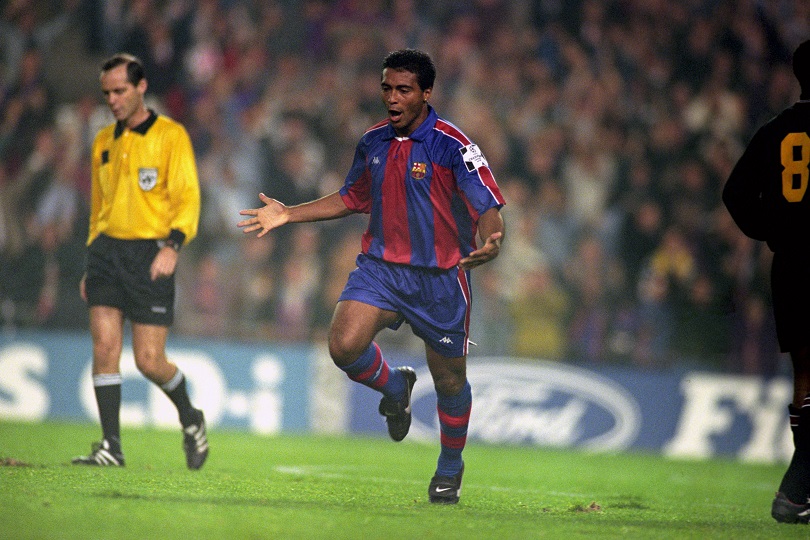
In every other aspect of his life, Neymar developed into the model professional after joining Barça. Driven by the unshakeable desire to add the Ballon d’Or to nine major honours with Los Cules, including two La Liga titles and the Champions League in 2015, the Brazilian adapted to Europe better than many thought possible.
His 100th Barcelona goal, at Granada in early April, came in his 177th match – nine fewer than Messi required. Only four players, and no one for nearly half a century, have reached the same milestone quicker.
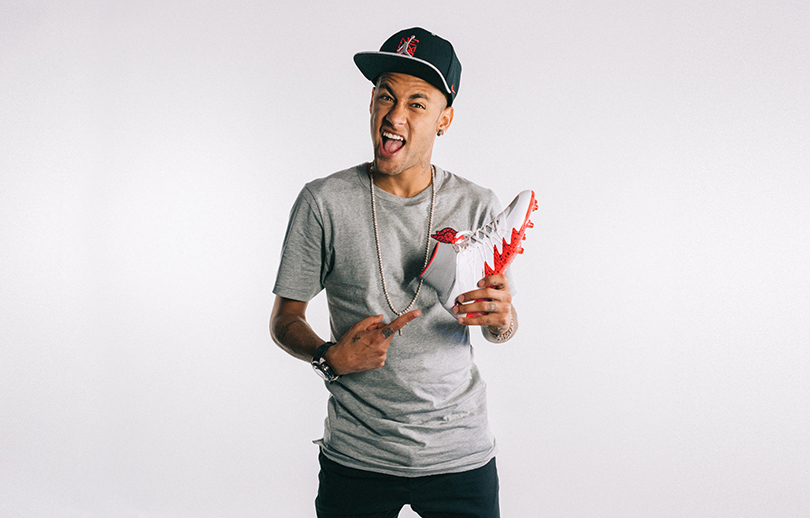
The biggest doubt was over his size. When Neymar first signed, he barely tipped the scales at 10 stones wet-through. His diet was poor, consisting of Brazilian basics: rice, refried beans and farofa, a toasted flour dish with different fillings, similar to couscous. And ice cream. Even his office has a fridge devoted to the stuff.
His diet was poor, consisting of Brazilian basics: rice, refried beans and farofa, a toasted flour dish with different fillings, similar to couscous. And ice cream
Placed on a special diet immediately upon arriving at Barcelona, Neymar drank nothing in a sporting context except what Sport newspaper labelled a ‘magic potion’ of B vitamins, protein and electrolytes to help replace lost fluids. He hit the gym as a result.
“Neymar does sessions after games,” ex-Santos boss Ramalho tells FFT, having visited his former charge earlier in the season. “Most players go to the pool to relax. People have an image of Neymar: he dyes his hair and is a party animal – but no one works harder.
“He has a gym in his home and he brought the physical trainer from Santos’s coaching staff to live with him, as the team train only once a day. He’s a strict professional; people just don’t know it.”
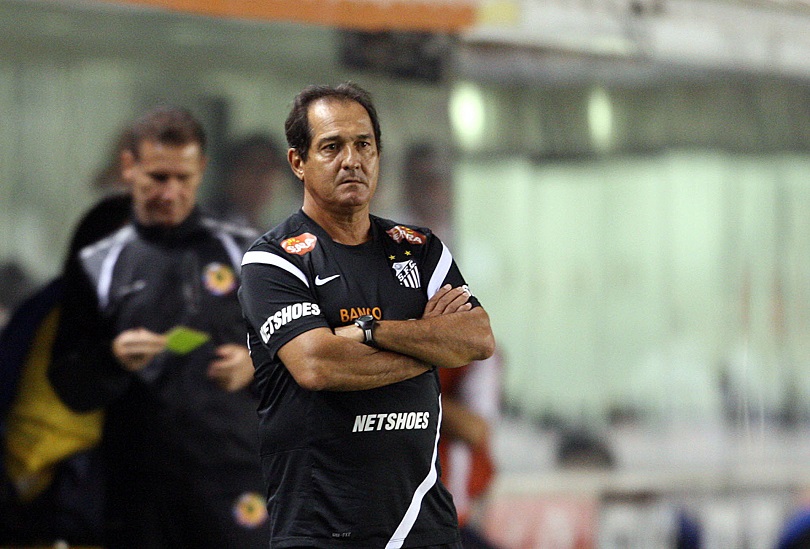
When the going gets tough...
It's no coincidence that the upturn in the forwards’s form came after he fell behind club-mate Luis Suarez and Atletico Madrid talisman Antoine Griezmann in the Ballon d’Or standings
Compare photographs of the wiry Neymar who was unveiled at the Camp Nou back in June 2013 – when it looked like a stiff breeze might knock him over – with the current souped-up version four years later, and the difference couldn’t be starker. As he removed his shirt during the post-game celebrations following Barcelona’s history-making win over PSG, the whole world could see the results.
Neymar 2.0, however, is about more than just muscle mass. Having been notoriously slow to get up to speed after pre-season or Spanish football’s winter break, the Brazilian’s improved physique has allowed the mind to flourish and return sharp and lean.
When Neymar slotted home a penalty at home to Athletic Bilbao in the Copa del Rey on January 11, it was his first goal since mid-October. Eight more followed, plus a further seven assists, in his next 15 games. It's no coincidence that the upturn in the forwards’s form came after he fell behind club-mate Luis Suarez and Atletico Madrid talisman Antoine Griezmann in the Ballon d’Or standings.
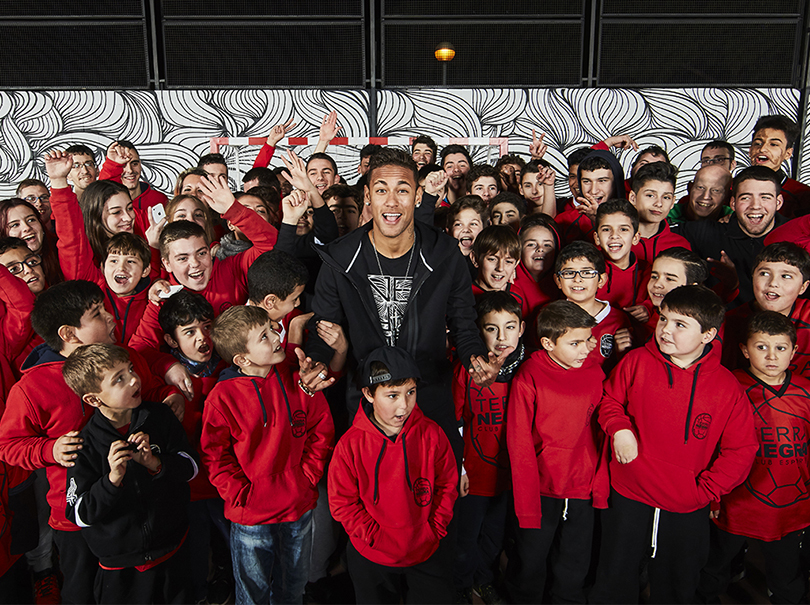
Renewed focus also helped to curb the 25-year-old’s natural exhibitionism. In the 2015 Copa del Rey Final against Athletic Bilbao, with five minutes to go and Barça winning 3-1, he tried a rainbow flick over right-back Unai Bustinza. The showboating sparked accusations of disrespect, not to mention a 10-man brawl. But Neymar has learned to control those instincts. The dribbles remain – as does the bad feeling with the Basque outfit – but a maturity is present in how the No.11 overcomes his opponents.
The dribbles remain but a maturity is present in how the No.11 overcomes his opponents
Neymar registered more assists in 2016/17 than in any of his previous ones at the Camp Nou. The penny has dropped. He may score fewer goals than he did before, but he completes more dribbles, makes more key passes and even helped to defend the left flank in Barcelona’s 3-4-3 system. Even his hairstyle switched to a more understated short, back and sides instead of the blonde, upturned-skunk Mohawk that went before.
“My style of play is to dribble,” said Neymar in an interview with La Liga’s in-house TV show last year. “I’m a forward. Dribble, cross, shoot – I know that’s what I have to do. There are some people out there who don’t like football, who don’t like dribbling. I don’t really bother too much about what they all say. I just try to help my team-mates as best I can, whether that’s with dribbles or goals – I don’t care.
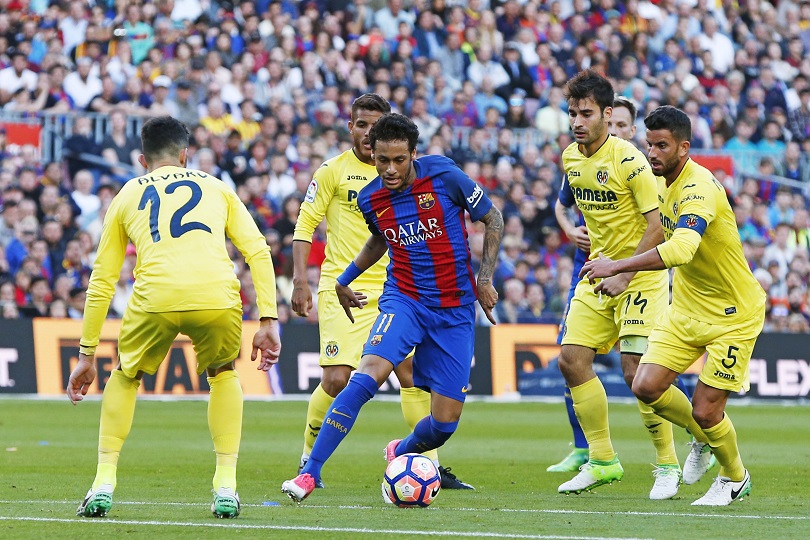
“I know that whenever I go onto the pitch, I’m going to get a bit of a kicking, but it just spurs me on for the next one.” The attitude of the street, of capoeira-style futsal, couldn’t be expressed much better.
The fight in him also saw the Brazilian pick up his fair share of bookings last season. Only Sergio Busquets and Luis Suarez received more yellow cards for Barcelona, with Neymar punished for committing fouls, diving and even tying his shoelaces. “You can’t expect a 25-year-old guy not to make mistakes,” a matter-of-fact Romario tells FFT. “He is growing up day by day. Brazilian football needs him.
“I have a lot of respect for Leo Messi – he is more capable and he has every technique – but today, Neymar is the best.”
Ney and Leo: beautiful, but broken
On the pitch after the PSG win, Messi, Neymar, Luis Suarez and Costa Snr could be seen in the centre circle paying homage to a ‘lucky’ lemon
Ah, yes. Messi. Neymar’s relationship with the Argentine has been the subject of intense debate since the six months before the Brazilian’s arrival in Catalonia. Neymar came as a sort of Barcelona Galactico and the Spanish press was flooded with rumours about Messi’s unease at sharing top billing with a 21-year-old who had never played in Europe – like “allowing two roosters access to the henhouse,” according to one correspondent.
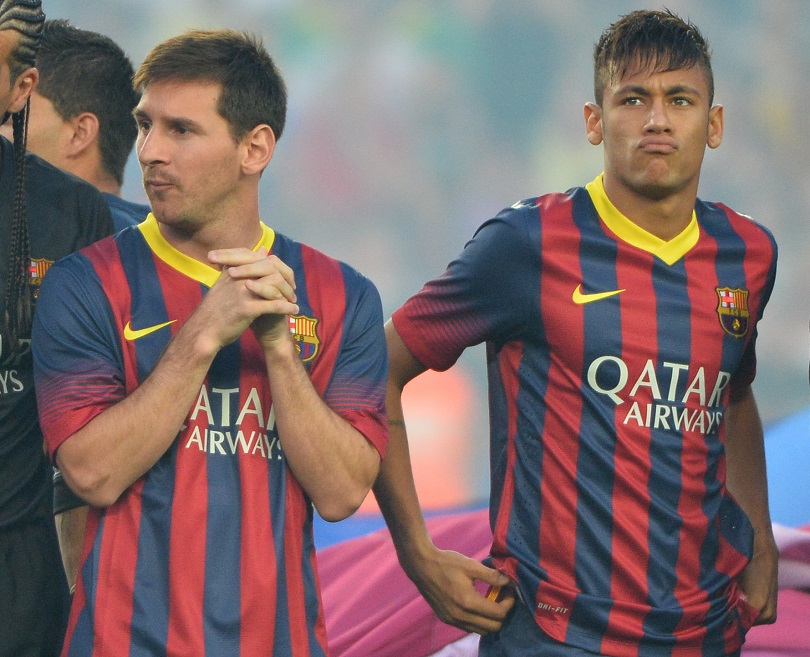
Neymar, a natural extrovert who was criticised last year for a lack of understatement at a memorial service for Johan Cruyff, tried to ease what was labelled a ‘Cold War’, but the more introverted Messi needed time.
Barça had a plan and it involved one family. Pepe and Alvaro Costa are father and son. Costa Snr, in his early-50s, has been with the Blaugrana since 2003, originally as a ninera – a ‘babysitter’ who helps the players with daily tasks – and now as Messi’s most trusted confidant. He accompanies the Argentine to every game for club and country, even sitting on the bench.
A former Nike executive, he spent six months explaining that Neymar was coming to ease Messi’s load, and together they would complement each other perfectly. Alvaro – his Brazilian-born son once on Real Oviedo’s books – performed the same role with Neymar for Nike.
Neymar always says that he was a fan of mine, but it embarrasses me a little
A genuine friendship blossomed thereafter. On the pitch after the PSG win, Messi, Neymar, Luis Suarez and Costa Snr could be seen in the centre circle paying homage to a ‘lucky’ lemon that the latter had carried ever since the first-leg defeat.
“Neymar always says that he was a fan of mine, but it embarrasses me a little,” Messi told La Liga’s TV channel last year. “He says it to my face, too. As soon as he came here, he spoke the truth straight away. It made me happy to hear him speak like that.
“When I broke into the first team here, I was as young as Ney. I was godfathered, to an extent, by Ronaldinho. I wanted to do something similar. He doesn’t have a bad bone in his body.”
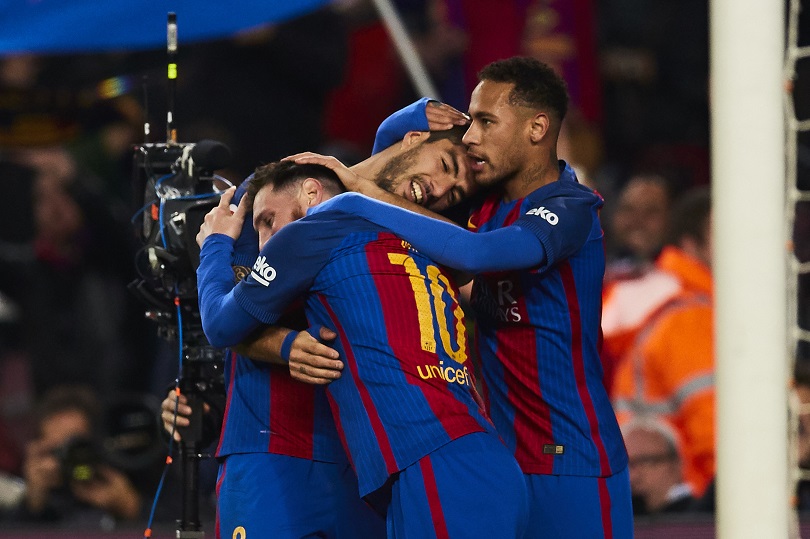
Also helpful was the 2014 arrival of Luis Suarez, already friendly with both players.
“Sometimes we will make fun of him for not understanding Spanish and he will just laugh, but then ask what we’re laughing at,” said the former Liverpool forward last year. “There isn’t a single team-mate who does not get on with him – kick him in training and he will still be giggling to himself.”
“Messi has helped me so much in my four years here, above all at the beginning,” Neymar said in 2016. “A guy who has won I-don’t-know-how-many Ballons d’Or comes up to me and says, ‘Don’t worry – just play your game, things will go well.’ Amazing.”
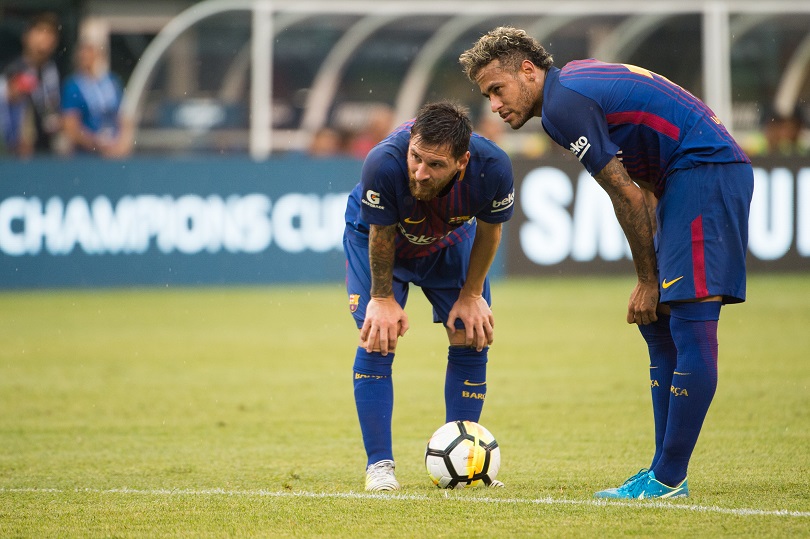
Yet Neymar has existed in a subordinate stasis as a result, something like ‘the sunken place’ in Jordan Peele’s fabulous comedy-horror film Get Out: able to see the prize, but paralysed to reach it and become the best footballer in the world.
His goals-per-game average is a third of Messi’s, but more than that, the play at Barça was directed away from Neymar. He had fewer shots, fewer dribbles and even received the ball less – when Messi was absent, 45% of Barça’s attacks came down Neymar’s left wing, yet it was just 35% when he did play. Even Neymar’s 100th goal came in a game that Messi missed through injury.
And perhaps that's why he's leaving. In July, Messi signed a new four-year contract that made him Barcelona's best-paid player in history. Neymar, however, has been involved in a contract spat: his father was due to collect £23.3m as a loyalty bonus for his son signing on at the Camp Nou in October last year, money which Barcelona have insisted should be held in notary until the Brazilian's future is sorted.
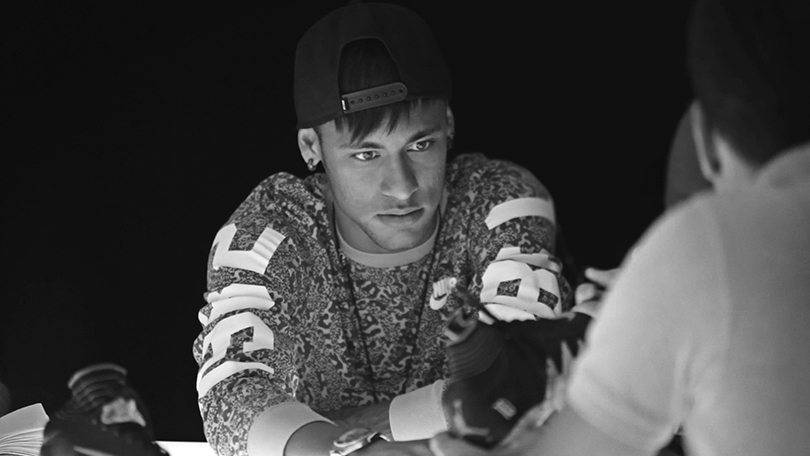
Herein lies part of the problem: Neymar will never be Messi at Barcelona, and he knows it. Even after his display against PSG last season – the goals, the Sergi Roberto assist, the follow-me faith from his best performance for the club – the take-home image was of the Argentine No.10 stood on an advertising hoarding being mobbed by the Camp Nou crowd.
PSG are offering Neymar his opportunity to be a star. The star.
“His performance was the best in Barcelona’s history”
Neymar knows he's now ready to play such a role at club level, just as he does for Brazil.
Neymar will approach his second World Cup finals as captain, having netted the decisive penalty to win Brazil’s first Olympic gold medal for football last September
It remains another key facet to Neymar’s psyche – an uncanny ability to perform under the most intense of pressures. He has scored in the finals of the Copa Libertadores, the Copa do Brasil, two Copas del Rey, the Champions League, the Olympics and the 2013 Confederations Cup, when Brazil beat world champions Spain 3-0 to boost a nation ahead of their World Cup on home soil. Pressure is a privilege – so much so that he told the Barcelona dressing room ahead of their turnaround against PSG, “I will score twice and play a big part in the comeback.”
Don’t forget who provided the match-winning assist for Sergi Roberto, having found the back of the net twice. The “99% of faith” had been rewarded. And in doing so, the Brazilian aped his childhood hero with a crucial one-man performance.
“It was like David Beckham against Greece when England qualified for the 2002 World Cup,” added Onda Cero’s commentator Martinez. “Neymar was brutal – unbeatable. You could argue that it’s the best performance in Barcelona’s history. In one game, he had distilled all of his skills and all of his best bits from four seasons into 90 minutes.”
Next summer brings another World Cup. Three years ago, Neymar’s tournament ended with a fractured vertebra in his back, inflicted by Juan Camilo Zuniga’s errant knee in the hosts’ quarter-final against Colombia. He missed Brazil’s 7-1 loss to Germany as a result, but has been at the forefront of everything good since. The Seleção were the first team to seal qualification for the 2018 showcase, and are back at the top of the FIFA world rankings for the first time in seven years.
Neymar will approach his second World Cup finals as captain, having netted the decisive penalty to win Brazil’s first Olympic gold medal for football last September before tearfully sinking to his knees. It was no coincidence that this shared shredding of the past came against Germany. Mineirazo? What Mineirazo?
Even the Argentine press are calling Neymar “the seventh wonder of the world” after his superb display, and delicious lob, against Uruguay in World Cup qualification
Even the Argentine press are calling Neymar “the seventh wonder of the world” after his superb display, and delicious lob, against Uruguay in World Cup qualification ensured Brazil’s presence in Russia. It was the Seleção’s seventh successive win.
“With Brazil, we see Neymar dressed as Messi,” enthused Cesar Luis Menotti, a former Barcelona coach who guided Argentina to their 1978 World Cup triumph. “He hasn’t lost his Brazilian rhythm, but what I’ve noticed is the increasing responsibility to his game. Tite’s team needs Neymar to help them play. He is a great player, and destined to be the best player in the world. For his country, we are witnessing a happy kid, full of skill, who is maturing into Brazil’s leader.”
Neymar has now scored 52 goals in 77 games for his country; 10 in his previous 10. He needs another 25 goals to catch Pele – Brazil and Santos’s most famous son – for the overall record. Yet he doesn’t flinch.
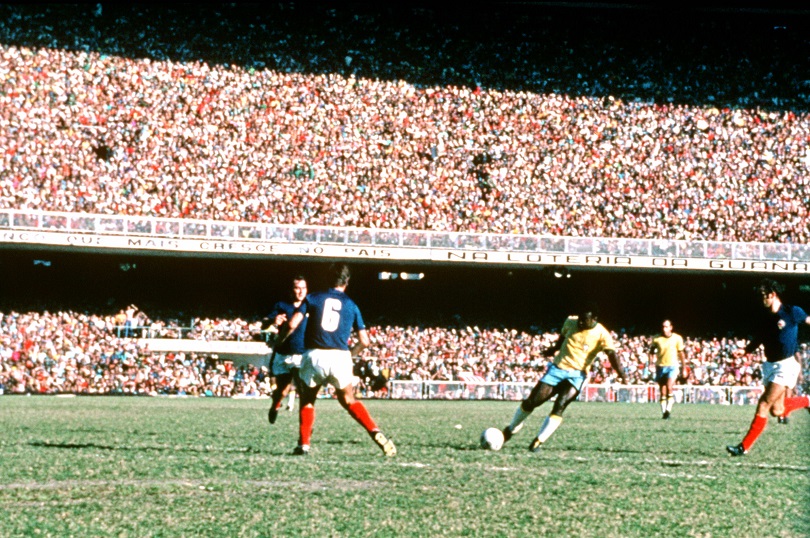
“Listen: I’m never going to be better than Pele,” he told FFT in 2015. “We know he is the king of football, and of course I have great respect for him. What I want is to help my team-mates. If it’s by scoring goals, I’ll be happy. Helping Brazil is most important.”
Neymar has even survived some extreme off-field scrutiny. He will be appearing in court later this year – along with his mother and father’s company N&N, former Barcelona president Sandro Rosell and current club chief Josep Maria Bartomeu – on corruption charges in relation to his transfer to the Catalan club in 2013. Brazilian investment group DIS claim that they’re owed 40% of the fee but received less because part of it was concealed by the people involved.
A previous legal case brought by the Spanish government was finally resolved last year, but the amount, originally “€57.1 million, full stop” according to Rosell, has now run above €100m with fines and further declared payments to the Spanish tax authority.
That the Brazilian’s evolution to the game’s summit during 2017 has developed to this backdrop is testament to his ability to focus only on the football. “Look, it will affect him 0.0001%,” Barça manager Luis Enrique has stated. He wasn’t exaggerating.
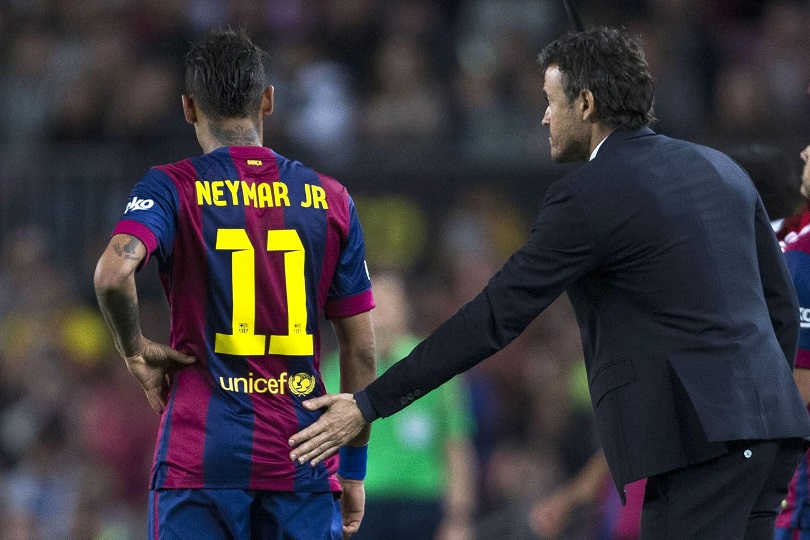
“He has worked his whole life for this”
Maintain his stellar form and captain Brazil to the World Cup in Russia, and immortality awaits
Faith, then, is the cornerstone of Neymar’s character. He knows he will dance past a defender in a one-on-one situation, and he believes in his rarefied talent. He has faith when there is only a 1% chance of success. Even the occasional lapse, such as an over-exuberant red card in Barcelona’s loss to Malaga and petulant sarcastic applause of the officials, is symptomatic of a fierce will to win. Neymar has never hidden his desire to reach the top, but his words now carry meaning like never before.
“I am playing the best football of my career,” he said in April. “I hope I can maintain my form to keep helping my team-mates. I want to win the Ballon d’Or, but I’m not in a hurry.”
“He’s a beast of a footballer,” his former manager Enrique said following Neymar’s 100th Barça goal. “He is one of the most unbalancing players in the world for opposition defences, and his signing by this club was a great decision. I hope he can score another 900 goals, so that we can keep seeing him at Barcelona for many more years.”
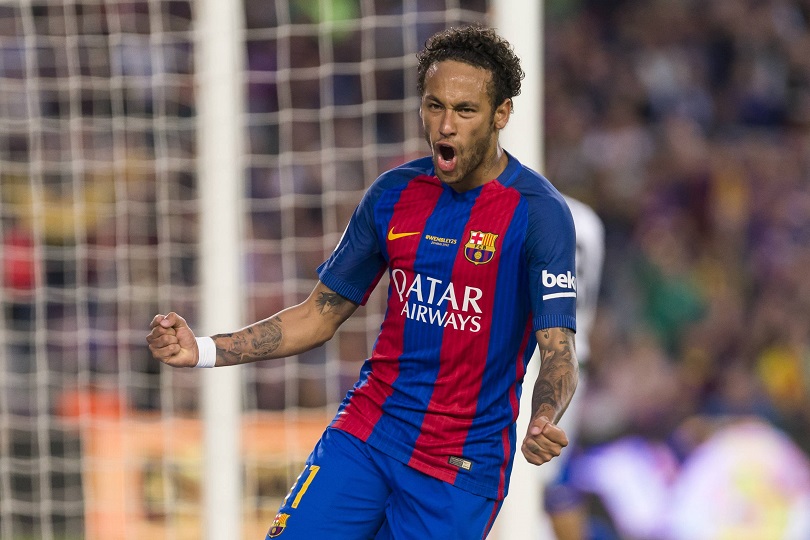
The ambition for longevity may have been fanciful, but the sentiments are not. Ten years from now, we could look at this as the moment Neymar’s career exploded. Maintain his stellar form, lead PSG to the Champions League and captain Brazil to the World Cup in Russia, and immortality awaits. Not even O Rei could manage the latter.
“He is irresponsible, but in a good way,” explains Ramalho, Neymar’s former coach at Santos. “If I invite him to my house, he would pick up a ball and start playing with it, because that’s his life. He loves football.
“One day Messi will stop and Neymar is already second – not just for his talent, but for the determination and discipline. He has worked his whole life for this and won’t stop now.”
One day Messi will stop and Neymar is already second – not just for his talent, but for the determination and discipline
One story from the Santos youth team is particularly instructive. For months, coach Antonio Lima would allow Neymar to use only his left foot in training, until his star student could shoot with the same power as he could with his right. Neymar hated it, but when he then scored a left-footed piledriver in the 2013 Confederations Cup Final against Spain, Lima reached for his computer.
“I sent Neymar an email,” Lima reveals to FFT. “I wrote, ‘Not bad for someone who hasn’t got a left foot!’ I still see him as that young boy... a young boy who became a star.
“There’s a reason for everything that is happening to him, and it’s all down to his hard work and his determination to achieve. I cannot wait to see him as the best footballer in the world.”
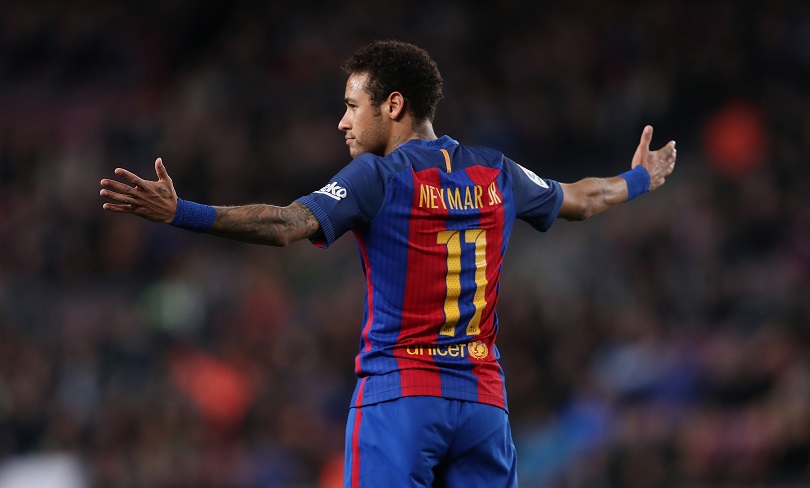
One legendary Brazilian – another with 1,000 goals to his name, so he says – believes that Neymar is already there.
“We need to change the criteria,” Romario tells FFT, a steely gaze enveloping his brow at the mention of the Ballon d’Or. “Neymar is the best player in the world today. Nowadays, judges look at who’s scored more goals or who faces the best opponents. Forget it! The best is who plays better for his club and national side. It’s Neymar!”
“Over the last four months,” said Brazil boss Tite recently, “the best player is Neymar. I told him I want him to be comfortable in the role.”
His captain’s instant reply? “You can count on me, boss – I’m ready.”
Watch out, world – and congratulations, PSG.
Additional reporting: Marcus Alves, Thiago Rabelo, Felipe Rocha
This feature originally appeared in the June 2017 issue of FourFourTwo. Subscribe!
Andrew Murray is a freelance journalist, who regularly contributes to both the FourFourTwo magazine and website. Formerly a senior staff writer at FFT and a fluent Spanish speaker, he has interviewed major names such as Virgil van Dijk, Mohamed Salah, Sergio Aguero and Xavi. He was also named PPA New Consumer Journalist of the Year 2015.
